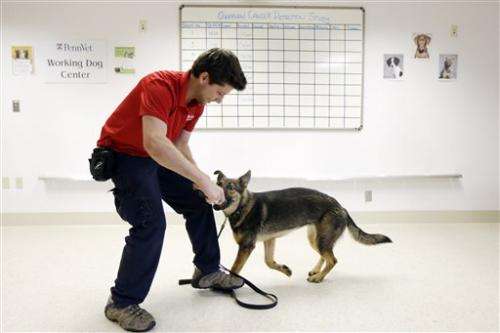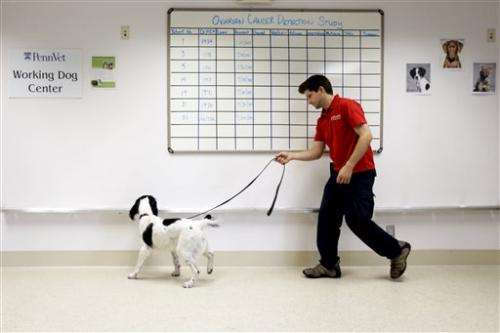In this Thursday, Aug. 1, 2013 photo, Jonathan Ball rewards Tsunami with play in the first round of training for a study that will eventually involve detecting cancerous tissue at Penn Vet Working Dog Center in Philadelphia. (AP Photo/Matt Rourke)
Researchers in Philadelphia have begun an ovarian cancer detection study that relies on dogs' keen sense of smell.
Scientists at the Monell Chemical Senses Center want to combine old-fashioned olfactory work with modern technology to help catch the disease in its earliest stages.
Ovarian cancer affects about 20,000 U.S. women each year. But survival rates are low because it's often not diagnosed until it has spread.
The University of Pennsylvania's Working Dog Center is training three canines using blood and tissue samples donated by ovarian cancer patients.
If dogs can identify the substance that marks the disease's presence, Monell researchers believe they can create a sensor device to detect the same chemical.
-
George Preti poses for a portrait at the Monell Chemical Senses Center, Thursday, June 20, 2013, in Philadelphia. Researchers in Philadelphia have begun an ovarian cancer detection study that relies on dogs' keen sense of smell. Scientists at the Monell Chemical Senses Center want to combine old-fashioned olfactory work with modern technology to help catch the disease in its earliest stages. (AP Photo/Matt Rourke)
-
In this Thursday, Aug. 1, 2013 photo, Jonathan Ball practices with McBaine in the first round of training for a study that will eventually involve detecting cancerous tissue at Penn Vet Working Dog Center in Philadelphia. (AP Photo/Matt Rourke)
The study is being funded by an $80,000 grant from the Madison, N.J.-based Kaleidoscope of Hope Foundation.
© 2013 The Associated Press. All rights reserved.





















